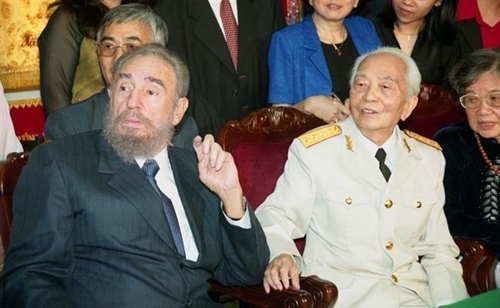For the Vietnamese people, Cuba and Fidel Castro have become a symbol of revolutionary heroism, undaunted spirit, and aspiration for freedom and happiness. The people of Vietnam have always given love, admiration, and gratitude to the people of Cuba and Fidel.
“For Vietnam, Cuba is ready to devote its blood”
President Fidel Castro made three visits to Vietnam, in September 1973, December 1995, and February 2003. In his first trip to Vietnam in September 1973, the late Cuban leader visited a liberated zone in Quang Tri when the war was ongoing. On September 15 five decades ago, Fidel visited Quang Tri, becoming the first and only foreign head of state to set foot in the liberated area in the South of Vietnam, just seven months after the signing of the 1973 Paris Agreement on ending the war and restoring peace in Vietnam.
    |
 |
|
Fidel Castro, First Secretary of the Communist Party of Cuba Central Committee, visits General Vo Nguyen Giap at his house in Hanoi on February 22, 2009 on his official friendly visit to Vietnam. |
The image of the Cuban commander-in-chief, in his olive uniform, standing in an enemy’s blockhouse raising the flag of the National Liberation Front of Southern Vietnam, became a great source of encouragement to the Vietnamese military and people to make greater efforts and determination in the struggle for liberation of the South and national reunification.
At Hill 241 Tan Lam, also known as Carol base - which was newly liberated, Fidel said, “For Vietnam, Cuba is ready to devote its blood.” Fidel’s statement melt the hearts of Vietnamese and Cuban people as well as peace-lovers around the world. It has become a symbol of the great solidarity between the people of Vietnam and Cuba.
Fidel Castro and the Communist Party of Cuba helped Vietnam impartially and purely in the spirit of noble internationalism. Immediately after this visit, Cuba helped Vietnam build many important projects including Dong Hoi General Hospital and Thang Loi Hotel, Luong My chicken farm, Moc Chau cow raising farm, and Son Tay - Xuan Mai road section; as well as sent experts to Vietnam to support the construction of Ho Chi Minh trail.
In this period, the Party, State, and people of Cuba gave their Vietnamese counterparts valuable and effective support, through training human resources, providing sugar, medicines, medical equipment and supplies, and helping upgrade Truong Son road and other roads in Quang Tri and Thua Thien Hue areas to serve the transport of weapons and heavy equipment into the Southern battlefield.
As both countries focused their efforts on building socialism, Cuba continued to help Vietnam in all areas, including support on scientific and technological cooperation, construction of production facilities, provision of plant varieties and livestock breeds, and engagement in the assessment of numerous construction and development projects in the Southeast Asian country.
Vietnam - Cuba special solidarity, a model of international relations
For over six decades, since the establishment of diplomatic ties, Vietnam and Cuba have always stood shoulder to shoulder in the struggle for independence and freedom, as well as in their cause of building and protecting socialism.
The countries' political relations have grown stronger and stronger. Senior leaders from the two parties, states, and Governments have regularly conducted visits to each other's countries, contributing to promoting ties and expanding cooperation across ministries, sectors, and areas.
The strong political and diplomatic relations between Vietnam and Cuba have paved the way for their economic and trade cooperation. In recent years, two-way trade reached around USD 250-300 million per year.
Vietnam and Cuba signed a bilateral trade agreement on the occasion of the visit to the Southeast Asian nation by Cuban President Miguel Díaz-Canel in 2018. This agreement came into effect on April 1, 2020, contributing significantly to spurring trade exchange between the two nations.
The Vietnam - Cuba Trade Agreement allows the two countries to continue expanding and diversifying their trade activities, and facilitate the import and export of goods and market access. The two sides target to lift the two-way trade value to USD 500 million by 2025.
On investment, Vietnam is currently Cuba's the largest investor in the Asia-Pacific region. Numerous Vietnamese-invested projects and joint ventures between the two countries have been established and are in operation. Several giant Vietnamese firms have shown interest in the Cuban market and explored investment opportunities in the Latin American nation.
Vietnam has actively promoted cooperation to help Cuba step by step to become self-sufficient in food, and ensure food security through various rice production support projects, such as a project on rice production at household scale, and a food production development cooperation program in the 2010-2015, and 2019-2022 periods.
In the COVID-19 pandemic, Vietnam provided essential medical equipment and financial assistance to support Cuba in the fight against the health crisis. Meanwhile, the Cuban side sent experienced medical workers to support medical human resources for Vietnam.
For education cooperation, Cuba annually grants numerous specialized scholarships to Vietnamese students every year, while Cuban youths are provided with scholarships to study the Vietnamese language and culture at Vietnam National University, Hanoi (VNU Hanoi).
For the Vietnamese people, Cuba and Fidel Castro have become a symbol of revolutionary heroism, undaunted spirit, and aspiration for freedom and happiness. Despite the long distance, the warm sentiments and faithful friendship that Fidel Castro given to Vietnam will stay forever in the hearts of generations of Vietnamese people.
With his contribution to Vietnam, Cuban leader Fidel Castro was awarded the Gold Star Order in 1982 and the Ho Chi Minh Order in 1989 by the Party and State of Vietnam.
Source: VNA